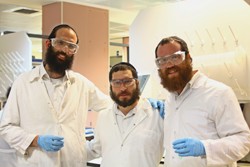Technion Outreach to Haredi Promise
In addition to the existing pre-university programs Technion-Israel Institute of Technology has created a special pre-university program for ultra-orthodox Jews (haredim) to enable them to study in university and enter the workforce. Member of the Israeli Knesset (parliament), Rabbi Dov Lipman, Chair of the Knesset Lobby for Job Integration in the Haredi Community, is interviewed here discussing the challenges to Israel and the success of the Technion program.
In 18 months haredim who never studied science and English and have only learned rudimentary mathematics are brought up to speed and the majority are accepted to Technion. Graduates are now working as engineers in high tech companies and some are pursuing advanced degrees.
“This sector needs to make a paradigm shift toward productivity. We are providing the opportunity.”
Prof. Noah Galil
In a national effort to significantly increase the notoriously low workforce participation within Haredi (ultra-Orthodox Jewish) communities, the Council for Higher Education has called for proposals to provide this special population with customized, but not qualitatively different, higher education study platforms.
This sector, currently comprising around 10 percent of Israel’s population, is expanding fast. Large families are the norm, and many are below the poverty line. Toda, about 25 percent of first graders are ultra-Orthodox and their segregated schooling does not include the core curriculum required for the development of technological and scientific skills. Statistics released on September 1 indicate that in predominantly Haredi towns, such as Bnei Brak or Modi’in Illit, eligibility for high school matriculation (bagrut) stands at 10 percent and below.
“The hardest part of the whole degree was mastering fractions and the ABC.” – Aharon Deutsch
Technion has created a model, based upon its proven success with pre-university foundation courses (mechina). Separate classes enable the Haredi students to maintain their own cultural and behavioral norms. “There is a very strong potential with this Haredi population that can benefit Technion, society, and Israel’s economy.” says Prof. Arnon Bentur, Technion Vice President and Director General
Mooly Dotan, director of the Center for Pre-Academic Education, says that the initial “Halamish” program for Haredi students was launched some six years ago. Halamish – literally flint in Hebrew – is an acronym for “Haredim studying applicable professions.” Backed by Israeli businessman and philanthropist Eitan Wertheimer, this initiative sought to ignite Haredi productivity in the academically qualified workforce and supports these pioneering students financially, academically with enrichment classes and learning strategy, and lends emotional support.
“These students are unbelievably motivated,” says Dotan. “They know how to study, they are tremendously target-oriented, and they want to find well-paid jobs.”
Of those who started, 16 were accepted to Technion and are now completing their studies in civil and environmental engineering, industrial engineering and management, electrical engineering, and mechanical engineering. Some of this vanguard has already joined the workforce and several have continued to a second degree.
Sarah Katzir, head of the Beatrice Weston Unit for the Advancement of Students, a key player in the success of the program, meets these highly motivated students toward the end of the mechina. “Their biggest problem is their lack of English, and Technion gives them a big push to bring them up to standard,” she says. “There are no shortcuts, no discount for academic requirements and no lowering of standards for admission,” Katzir stresses.
David Shenkar, a graduate in Information Systems, is a new employee at MedaTech Information Technology Ltd. Shenkar said, “When I got my first pay slip from the company and saw that income tax had been deducted I was very happy. I know that most people wouldn’t be pleased about that, but I was simply delighted that I now made enough money to pay income tax!” He added, “I couldn’t have gotten a Technion degree without the help of my wife. A few times I wanted to quit, and she told me that I was to keep learning until they threw me out. I’m glad I listened to her.”
Lack of funding put this original Halamish program on hold, and it has now been reinvented with a new intake of 40 pre-mechina students who are studying on the Technion campus in the National School for Practical Engineers (Handessaim) building. Their tuition is paid for by the government, and Atidim, together with Technion, are providing a stipend.
Another new initiative involves a successful off-campus mechina at the Haredi College of Bnei Brak (Mivchar), an ultra-Orthodox stronghold near Tel Aviv. Some 18 graduates of this preparatory program, who have shown both the requisite aptitude and a phenomenal capacity for learning, are now studying for a BSc in Geo-information, under the auspices of Technion’s Faculty of Civil and Environmental Engineering (CEE). Graduates will seek employment with the Israel Mapping Center, which is facing a severe shortage of qualified personnel as hundreds of its employees approach retirement. “Each of these students will be a role model in their community,” states Bentur.
Why are Haredi students different from all other students?
Disadvantages:
|
Advantages:
|



